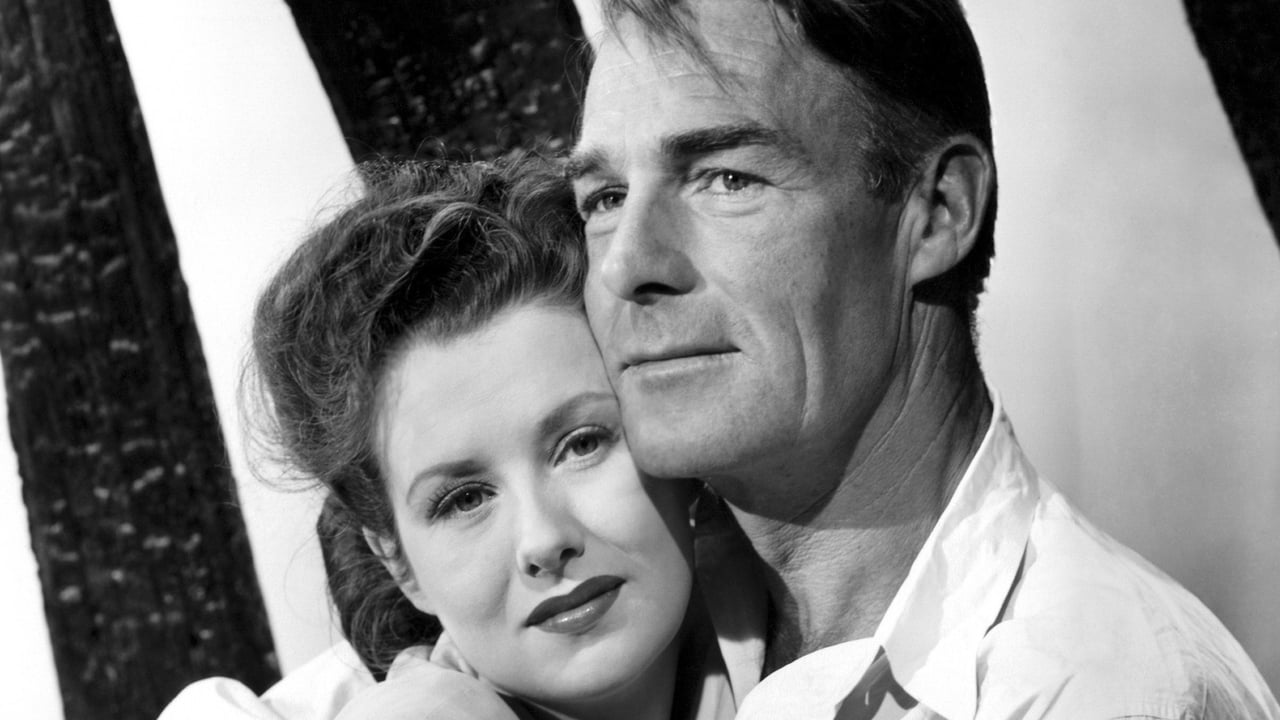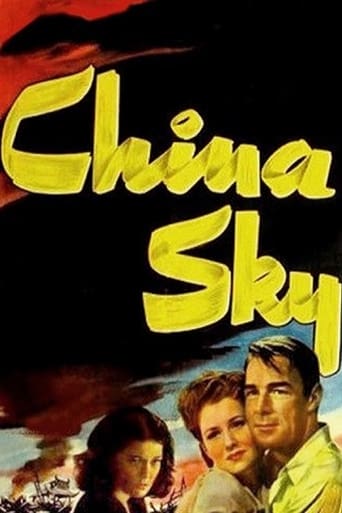

This film is an interesting mix of what you'd expect, but then what you do not. We not only have Anthony Quinn playing an Asian, we have Korean actors playing Japanese. Scott is playing a hero, and actually brings his role as a Doctor over so much that it is convincing. Rather than list the cast, let's just say everyone is quite effective from Scott and Warrick to the young boy playing the Goat. The story is based on a novel about the war in Asia and this film is one of the earlier ones about that part of the war.. Scott, the American Doctor who is coming back a hero, from the US raising money for his Hospital, near the front with the Japanese in China. He brings a new wife who is not quite ready for the facing pf air raids, and wants to take her huband away from there back to the US. The plot gets a bit more twisted bacause of the beautiful woman doctor he works with, the Chinese Doctor and the Japanese War Prisoner. Couple those with the Chinese Undergound and there are a few twists.The best thing about the film is the fighting sequences look better here than in other war films made this decade. The diverse cast brings off a good film despite the fact they are playing roles other than the expected ones. The love and tragic story is done pretty well. One major flaw though, late in the film Scott gets shot, and then in the next scene and the rest of the film, there is no sign he was ever wounded.
... View MoreFilmed as WWII in the Pacific was coming to a conclusion, this adaptation of the Pearl Buck novel of the same name deals with the Japanese invasion of China some years before WWII began. The reviews here thus far have been pretty negative, sometimes scathing. My review will be more positive.I haven't read the novel. However, I did consult a summary. The film follows the novel in most respects , until the last part, when the Japanese paratrooper invasion is added, and the ending is changed to more conform to the expectations of a morality play. Buck's traitorous Chinese Dr. Chung is transformed into the traitorous Korean-Japanese Dr. Kim, apparently for political reasons. His equally traitorous brother is deleted, as is Ya-ching: a nurse having an affair with Dr. Chung, while he is courting the more desirable intern Siu-mei, as dramatized. Siu-mei's father, who doesn't like Dr. Chung, and approves her infatuation with guerrilla leader Chen-ta, is also deleted. The Englishman in a nearby town, who develops an affair with Louise: the bored socialite wife of missionary Dr. Thompson, is also deleted. Thus, the several romantic triangles in the film are actually more complicated in the novel, with deleted characters also involved.The screenplay takes place exclusively in and around a fictional Chinese village, in a region with many caves, which come in handy as safe havens when bombs are dropped on the village(a frequent occurrence). They also serve as hideouts of the local guerrilla forces, and for making and storing their munitions and other necessities.Dr. Gray Thompson(Scott), from a wealthy family, chose to spearhead the building of a mission hospital in this village, which the Japanese consider rather important, but their ground troops haven't yet reached it. However, he's back in the US, securing additional funding and equipment. Meanwhile, American doctor Sara Durand is in charge of the hospital, with supposedly full Korean Dr. Kim in charge of the men's section. Kim is disgruntled that he is under the authority of a woman: something unheard of in Korea. Sara clearly is upset when she receives a telegram that Gray will arrive, with his(new ) wife, Louise . It doesn't take Louise long to imagine that Sara was hoping to eventually become Gray's wife, although Gray had shown no signs of thinking of her in a romantic way. Louise becomes increasingly paranoid about a denied romantic relationship between the 2, as they spend most of their waking hours in the hospital. Also, she much fears (with good reason) the frequent bombings, and feels no connection with the Chinese or her surroundings. Gray tries to reassure her of his love, and balks at her demand to quit this life and return to the US.Meanwhile, Dr. Kim feels alienated by the evidence that his girlfriend , intern Siu-mei, actually more likes guerilla chief Chen-ta. Thus, he finally gives in to the requests of captured hospitalized Japanese Colonel Yasuda that he make him seem more sick than he is, to delay a public trial as a war criminal, and to arrange for a telegram to be sent to the Japanese military. Louise unknowingly becomes involved in this plot when Kim claims he can arrange for a plane to take her and Gray safely out of China. Kim thinks Yasuda's idea is that he will also be on this plane., But actually, the coded telegram that Yasuda has written asks for a paratrooper drop. After house boy 'Little Goat' reveals what he has seen, Gray gets very suspicious of some dealing between Kim and Yasuda, and confronts them. Yasuda pulls out a stolen pistol and shoots at them, killing Kim, escaping to meet the paratroopers. Gray quickly organizes a village defense against the Japs, and Chen Ta rallies his cavalry to ride to the village. A battle ensures, with the Japanese presumably eventually being vanquished, although this is not shown. During the battle, Louise, in the hospital, becomes hysterical, partly from her indirect role in summoning the paratroopers. She rushes outside, into the line of fire, presumably trying to reach Gray, and is shot dead by the Japs, thus ending Gray's romantic dilemma. Siu-Mei's romantic dilemma is also solved by Kim's death.(In the novel, Louise returns to the U.S. without Gray).Most reviewers here decry the casting of Mexican Anthony Quinn as Chen-Ta, as an intolerable phoniness. Well, in his career, Quinn was cast as many types of ethnics, including a Berber chieftain, and even the Prophet Muhammad. But, he always looked basically Mexican. At least, he was made up to look more oriental than was Peter Lorre, in "They Met in Bombay", and later in "Around the World in 80 Days". Caucasian Carol Thurston, who also commonly was cast as various ethnics, was acceptably made up to look Chinese. Young Ducky Louie, as houseboy 'Little Goat', provided some reprieve from the tense drama, with his charm and rapport with Scott. I thought Scott, Ruth Warwick, as Sarah, and Ellen Drew, as Louise, played their roles well. Richard Loo overdoes his characterization of a despicable Japanese, but consider the mindset of most Americans and Chinese at this time. Some complain there's not enough action. How many times do you want the Japs to bomb his village? What about the battle near the end, not to mention the frequent battles between the main characters before. With a little more care in the screenplay and production, this could have been a first rate drama, with an exotic setting, to add interest.
... View MoreRandolph Scott gets top billing, but ultimately this is Ruth Warrick's picture. She's a doctor holding together a makeshift hospital in China while its founder (Scott) is on his way back with much needed supplies--and a new wife, to her thinly-veiled disappointment. Having seen Warrick in a few other 1940s films, I can understand why the doc failed to notice her: despite her attractiveness, she never really exuded any sex appeal. But her character is very likable, while the new wife's shallowness becomes apparent within minutes of her entrance. And that's the problem with this picture--too easy. In fact, all it does is lower the audience's opinion of the foolish doctor for not seeing what's painfully apparent even to the other character's who don't speak the language. There's a similar subplot involving another doctor and a nurse, that's equally obvious. A wounded Japanese villain provides more action for the story, whose loose ends get tied up all too neatly and quickly. Either Pearl S. Buck's original novel just wasn't one of her better ones, or this movie doesn't do it justice. Nevertheless, it probably made for a decent lead-in on a double-feature back in the day.
... View MoreOne of the most popular American authors of the 20th Century was Pearl S. Buck. A daughter of Presbyterian missionaries in China she developed a real love for the people there and her novels beginning with The Good Earth popularized China and its people in the USA. Though her work remained popular, Buck never equaled what she did in The Good Earth as literature. She also never took note of other trends developing in China and she became quite the apologist for the Kuomintang government of Chiang Kai-shek with both its strengths and weaknesses.Indirectly Buck was one of the people responsible for the Red Scare and the great question of who lost China in the USA as if it was our's to lose. Her work so popularized the Chinese here that when China went Communist in 1949, the shock was so great that it had to be some kind of conspiracy at work. So we went hunting for the conspirators.Randolph Scott and Ruth Warrick are the kind of medical missionaries Buck idealized. Ruth's crushing on Randy real bad, but he can't see her except as a work partner. As the film opens he's off in America trying to get better equipment for the mission. Scott brings back a society wife in Ellen Drew also and the hostility between the two women develops immediately. Very similar to the plot line in The Good Earth where Paul Muni takes a second wife, a kind of Chinese trophy wife.Meanwhile guerrilla leader Anthony Quinn brings a wounded Japanese Colonel played by Richard Loo to the mission. He wants him healed so he can be tried for war crime atrocities, a very early mention of that concept.Loo made a career in playing nasty Japanese folks during World War II and after. Played them all with a Fu Manchu kind of sneer. He's a shrewd article though as he works on the jealousies of both Drew and Korean doctor Philip Ahn who's crushing out himself on Carol Thurston who has eyes for Quinn.Romance, jealousy, and war are the hallmarks of China Sky. This story set in a remote corner of western China is a bit much to believe. Spoiled society brat that she is, the viewer is going to have a lot of trouble with Drew's pouting about the fact that this little village ain't Park Avenue. Was she that dumb that she didn't know what she was getting into?Today we could never get away with casting occidental types like Anthony Quinn and Carol Thurston as Chinese even though both give fine performances. Quinn especially. Quinn, Jose Ferrer, and J. Carrol Naish probably played more ethnic types than any other players in film history.War of some kind was a factor in China from the overthrow of the Manchu Dynasty in 1911 until the Communists won in 1949. The issues are very complex and a film like China Sky isn't the venue for a discussion of same.
... View More